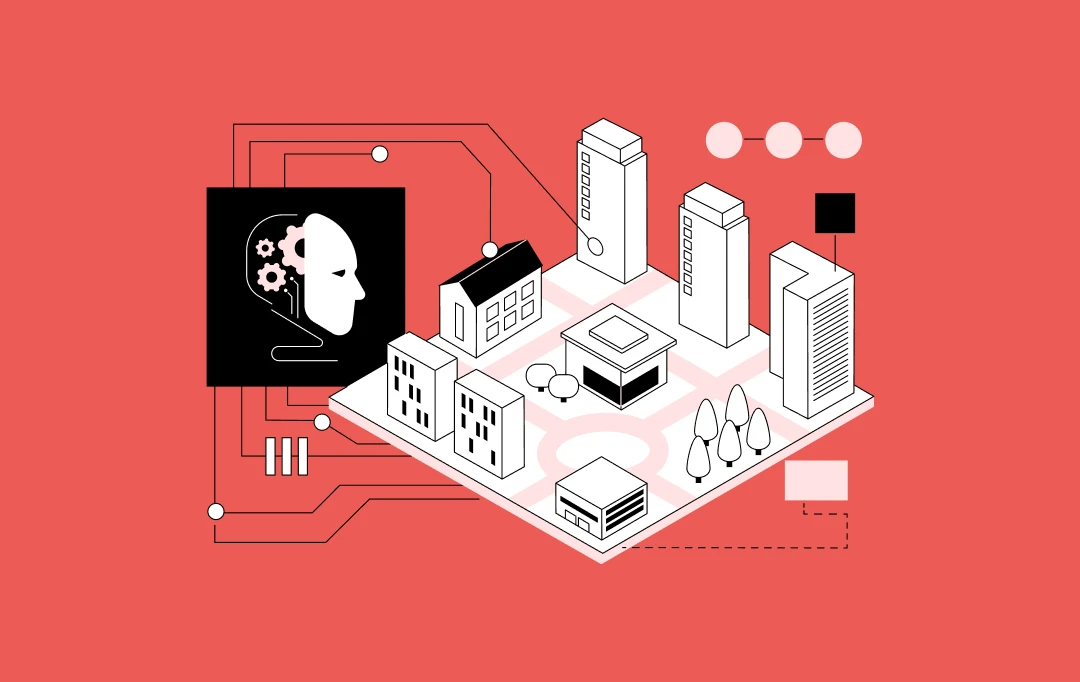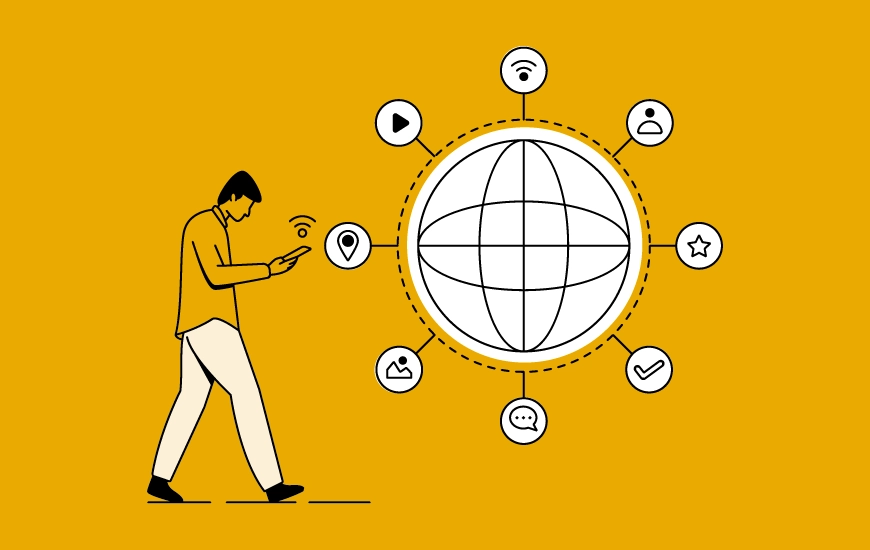- Top IoT Technology Trends 2021
- 1. IoT security
- 2. IoT fueled with 5G technology
- 3. Blockchain
- 4. IoT enabled AI applications
- 5. Digital twins
- 6. Voice activated IoT devices
- 7. Smart cities
- 8. Edge computing
- 9. Traffic management
- The Emerging Industry Wise IoT Applications
- 1. Agriculture
- 2. Transportation
- 3. Healthcare
- 4. Consumer electronics
- Conclusion
When we say IoT, what comes to your mind?
I am sure it is the waking up scene with coffee ready for you, automatic lights, reminders for your tasks or the finished groceries and so much more.
Am I right?
Well these all are the things that we have heard, seen and read about. And to some point these technologies are helping to make such a thought into reality.
With the current technological advancements, IoT technology currently is in its golden age, transforming various industries by storing and processing data in a distributed manner and making enhanced productivity.
IoT is a complex ecosystem of interconnected devices that can communicate with each other. These smart connected devices are able to gather, share, and analyze information and take actions accordingly.
Research shows that there will be 35 billion smart devices online by 2021 and in the future of IoT this number will rise to 75 billion by 2025. So, it is safe to say that IoT is growing at an enormous rate and so are the use cases, trends and technologies surrounding it.
The emerging trends in IoT are majorly driven by technologies like artificial intelligence, blockchain, 5G, edge AI, and edge computing. Within this interconnected web of technological advances lies in the business value of IoT applications like smart wearables, smart homes and buildings, smart cities, autonomous cars, smart factories, location trackers, wireless sensors and much more.
[Also Read: The Role of IoT in Building Smart Cities – 10 Applications and Use Cases]
This level of connectivity helps consumers experience a comfortable secure household that they can control and monitor anytime. IoT also promotes healthcare, cost and energy savings. With the internet of medical things, the healthcare sector has increased its market and patient service. From a business point of view, IoT project succeeds by making operation management more efficient, improves the productivity of the resources, and reduces human labor and above all, it provides vast business opportunities.
Since we are well aware about what IoT is and how it works, let us jump straight to IoT statistics that you should not ignore!
Statistics You Need To Know
- According to Fortune Business Insights, the global internet of things market size stood at USD 250.72 billion in 2019 and is projected to reach USD 1,463.19 billion by 2027, exhibiting a CAGR of 24.9% during the forecast period.

- The Internet of Things future (IoT technology) market in the U.S. was estimated at US $45.7 Billion in the year 2020. China, the world’s second largest economy, is forecast to reach a projected market size of US$169.1 Billion by the year 2027 trailing a CAGR of 29.9% over the analysis period 2020 to 2027.
- The enthusiasm for Internet of Things future adoption is not only global, but also across all industries. Among the enterprise IoT decision makers Microsoft surveyed, 85% say they have at least one IoT project in either the learning, proof of concept, purchase, or use phase, with many reporting they have one or more projects currently in use. Adoption rates are similar across surveyed countries such as, US, UK, Germany, France, China, Japan and core industries like – manufacturing, retail/wholesale, transportation, government, and healthcare.

- 94% of businesses will use some form of IoT by the end of 2021. Among current IoT business adopters, 88% believe IoT is critical to their business success.
Now that you are aware of the Internet of Things future facts and numbers regarding IoT, let us discuss emerging IoT trends, shall we? Past turn of events such as the unfolding of the 5G technology, latest developments in AI Blockchain, the on-going pandemic crisis will dictate the trend of IoT emerging technologies 2021. But we cannot deny the fact that the future of IoT will be smart, secure and reliable, let’s understand how:
Top IoT Technology Trends 2021
1. IoT security
Till date, security is one of the major concerns when it comes to such an extensive level of connectivity. A security vendor has detected over 100 million attacks on IoT endpoints in the first half of 2019 alone, highlighting the continued threat to unsecured connected devices. As a result, security is an evolving IoT trend and many companies around the globe are developing IoT security solutions using different technologies.
2. IoT fueled with 5G technology
5G technology is not just a new generation of wireless technology, it is a foundation to release the full potential of IoT thus revolutionizing technological growth. It is without a doubt that the most important internet of things emerging technologies 2021 since reliable connectivity will result in better performing IoT devices. Real time data processing, lower latency, network slicing, higher transmission speed and extensive coverage are a few things that 5G brings on the table.
(Also read: 5G and IoT: Emerging Technologies With Endless Use Cases)
3. Blockchain
Increased adoption of blockchain technology is one of the latest IoT trends.
Blockchain can ensure data protection in IoT devices. Blockchain allows successful interaction between multiple network nodes and ensures safe record keeping and that is why it is a great fit for IoT applications since they are also distributed by nature.
4. IoT enabled AI applications
Two very different technologies such as the internet of things and artificial intelligence can together provide commercial solutions. AI algorithms now need very less data in order to deliver good and effective results. IoT development services in industries making use of these two technologies can help automate many processes and reduce downtime, reduce operating costs, increase efficiency and enable predictive maintenance.
5. Digital twins
The digital twin technology trend came into limelight in 2020. A digital twin is a virtual representation that serves as the real-time digital counterpart of a physical object or process. A digital twin can be used for multiple things such as monitoring, diagnosing, optimizing and controlling asset performance and utilization. From US $3.8 billion in 2019, the projected compound annual growth rate of the digital twins market will be US $35.8 billion by 2025.

6. Voice activated IoT devices
Amazon Echo, Siri, and Google Assistant have taken voice-based user interfaces to a different level. Voice interactions will now be used in other applications across various industries that will allow us to change settings, giving commands and receiving results from our smart devices. Banks and FinTech startups have been one of the earliest adopters of voice and speech recognition technology. Another impressive development in voice recognition technology is voice biometry. It allows organizations to create a digital profile of someone’s voice, by analyzing a series of specific characteristics such as tone, pitch, intensity, dynamics, dominant frequencies, etc. Companies are confident that this process will be more secure than the methods that are currently in place.
7. Smart cities
While witnessing the emerging technologies in IoT, one cannot ignore smart cities. Since the past five years, many governmental institutions have begun IoT technology projects that will impact entire cities. With enormous amounts of data, the government will be able to implement various intelligent solutions for multiple issues like traffic congestion, citizen safety, energy utilisation, sustainable development, etc.
For example: In order to improve urban planning, transportation and public safety, Singapore collects, analyzes and shares data from connected sensors.
8. Edge computing
By the end of 2021, Edge Computing is expected to increase dramatically due to distant work and COVID-19. This innovation makes new kinds of business to emerge. As per Forrester, end-of-life marketers may hold and keep a sizable offer in the public cloud market driven by the way that significant retailers, for example, HPE, Dell, and IBM are creating solutions for edges with cloud-like features. In a growing workforce, edge computing permits organizations to serve clients in new areas and back flexibility and control.
9. Traffic management
Thinking about going to the office first thing in the morning makes you go bonkers.
In any city globally, traffic and blockage are major torments that lead individuals to invest more energy and time on the road during the day. Long journeys erode economic productivity in metropolitan areas around the world, making traffic jams a significant concern.
Current IoT trends recommend that IoT technology is appropriate to address this challenge. Today, many organizations are providing solutions and arrangements that mean to utilize IoT installed technology in vehicles and traffic systems to design more smart traffic networks, expected to decrease unnecessary traffic and congestion.
Business owners, entrepreneurs and governments are using IoT in order to increase work efficiency, save money, and to create a better user experience. While top IoT technologies are still in their early stage of development in many applications, their overall impact on the top industries is tremendous. Let us look into some applications in IoT devices for specific industries.
The Emerging Industry Wise IoT Applications
1. Agriculture
Did you know that the world population will reach gnarly 10 billion in 2025 and global food demand will witness a 70% increase? We do have a simple solution – smart agriculture (IoT agriculture). With the help of IoT sensors, farmers can make more informed decisions. This will help them achieve higher and better quality crop yield. It will also reduce costs by reducing the use of resources such as pesticides, water, and electricity.
2. Transportation
In 2021, the upcoming cars will be smart cars, which means they will be connected to the internet. These cars will ensure better safety not only for its drivers but also for other vehicles on the road. They will also be capable of software updates and lower emissions. Right now we do have e-scooters, bicycles and skateboards but with IoT evolving companies will be able to reduce their operational costs and deliver a better experience to the drivers and passengers of the vehicle.
3. Healthcare
Due to the recent turn of events, the healthcare sector has experienced a boom of IoT innovation. During the Covid-19 crisis, demand for IoT health applications like telehealth, digital diagnostics, remote monitoring, etc. have skyrocketed, thus enabling real-time tracking and alerting the patient’s health. IoT has improved the patient engagement and satisfaction with doctors by making interactions and procedures easier and more efficient.
4. Consumer electronics
IoT can enhance user experience and customer satisfaction simultaneously by providing convenience in people’s everyday lives. IoT helps in collecting consumer’s data efficiently and allows the producers to analyze and optimize the usage of their devices or applications.
For example: Due to the on-going pandemic wearable health monitoring devices will become a way of life.
Conclusion
IoT solutions are growing worldwide and the future trends of IoT will play a significant role in the near future. Major technologies such as blockchain, AI, 5G, cloud computing, and so on, are going to play a very crucial role in the advancement of global connectivity and the internet of things. IoT is taking over all aspects of our lives so, if you have an out of the box idea, now is the time to get in touch with an IoT application development company. We are one of the top IoT app development company in USA that creates applications which operate using sensors and deliver outstanding results.



Top 10 Use Cases and Benefits of IoT Energy Management Changing the Power Industry
The escalating demand for energy consumption worldwide is projected to reach around 800 exajoules by 2050, a big jump from over 600 exajoules in 2019. This fastest-growing global energy use is throwing a major curveball - prioritizing smart energy for waste management. In this pursuit, the rise of the Internet of Things (IoT) offers a…

IoT in Construction: 10 Transformative Use Cases and Their Impact
The construction industry has always been the backbone of our infrastructure, but it hasn't always been quick to adopt new technology. Nevertheless, this fact is changing with the evolution of the Internet of Things (IoT). IoT has moved beyond being just a buzzword to a fully integrated tool transforming how construction projects are planned, executed,…










